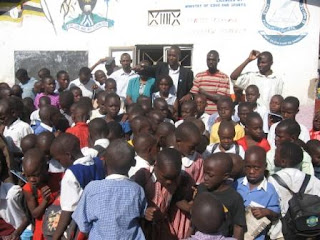SCHOOL CENTRED HIV AND AIDS CARE AND SUPPORT IN UGANDA.

Schools offer the infrastructure to reach a vast number of young people before they become infected. As the HIV epidemics takes a new dimension so needs the response. There should be increasing understanding that prevention, treatment, care and support are all interrelated. This calls for commitments to moving towards universal access to prevention programmes, treatment, care and support. There is need for the education sector to take responsibility to respond to the changing demands caused by the epidemic among education personnel and students. Each year the epidemic brings new challenges especially in the area of increasing access to treatment. Government in Uganda has not made an effort to provide education to HIV positive children who might be ill and to protect HIV positive teachers from stigma and discrimination. The guiding principle should be protecting the very functioning of the education system and ensuring that teachers continue to teach and the children stay in school and continue to learn. In Uganda this will require the education sector to take an active role in all aspects of prevention programmes, treatment, care and support. As a result the role of schools in HIV response can go much further than simply providing prevention education to its own communities.
Schools in Uganda have no choice but to respond to the impact of HIV and AIDS on education staff, learners and local communities. The challenges and needs are daunting and multifaceted. Schools should offer an unparalled resource in scaling up of HIV services. Failure to do this will undermine the efforts to achieve education for all (EFA) in the country.
Alluded, it is important to note that the education system in Uganda is seriously overburdened. In Uganda the education system is struggling with competing priorities and does not necessarily see HIV related care and support as its role. Government officials, school leaders and teachers perennially battle for the human and material resources simply to provide basic education in less than perfect conditions. An additional burden in the form of responding to a stigmatized disease is viewed as an added and perhaps confusing responsibility in terms of prevention, care and support and government has remained silent to fully engage in the issue. This however, should be no excuse for inaction. The unfortunate reality across the country is that learners and educators have a huge range of needs, some of which existed without HIV and others HIV specific. The impact of AIDS is threefold highlighting existing problem, enlarging ongoing problems and creating new problems. Schools need to respond to these needs both to protect the basic functioning of the system not only should teachers keep on teaching and students attend classes and learn but also as a wider responsibility to respond to HIV and AIDS. Failure to do this will undermine efforts to achieve both education for all goals and other millennium development goals (MDGs) in the country.
Comments